Episode 1: The Witch of the Woods
Don't hunt in Kessig, they said. The dogs will find you.
Maybe that had been true right after The Travails, when you couldn't swing a cat without a wolfir devouring it, but it isn't true anymore. Those dogs are dying off, and the woods are keen for the taking. They say you can always tell a Falkenrath by their awful stubbornness about hunting; their ravenous nature; their unending quest to close their talons around the food that least wants to be eaten. To be a Falkenrath is to make your home in the heights, such that everyone else sees you hunt.
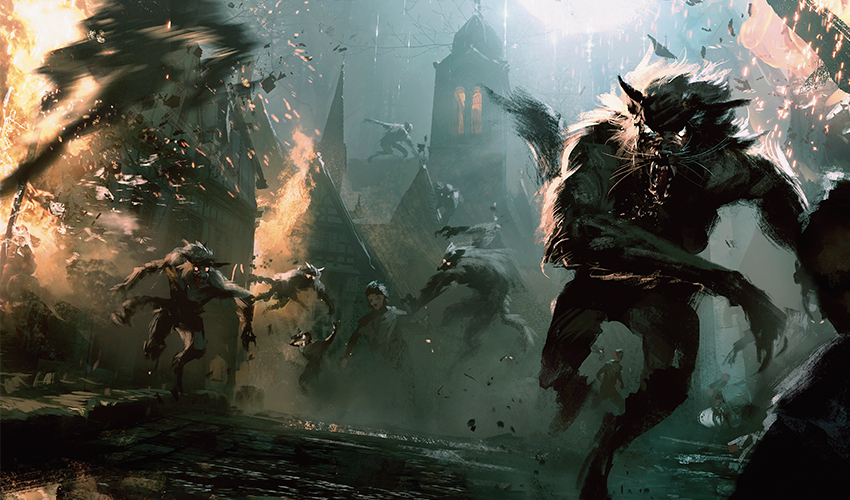
Klaus is no different. His feet slap against the brush; blood drips from his slick chin onto the reddening leaves of the Ulvenwald; bolts whistle past his ears. Despite all this, he grins. They saw him, all right. Perhaps the traveling monk disguise was a bit of an affront—the pack of hunters at his back are worked into a holy froth. He didn't even know they carried so many bolts on them at once—the thunk thunk thunk of them is like the rap of a giant's knuckles on the trees around him.
A fallen trunk bars his path; he leaps it and chances a look at his pursuers. Five of them: two big and broad, armed with crossbows more akin to ballistae than anything portable. Cute. But soon enough it won't matter what they carry.
The thought pulls a laugh deep from the depths of his chest. Every drop of his alchemically refined blood calls out for dusk, and dusk has finally answered. A chorus rises within him, a cult begging the arrival of their unseen god, and he knows deliverance is near.
Because the truth is that he's never really been in danger. Dogs could trouble him, holy men can trouble him, other vampires can trouble him—but these humans are no issue at all. Falcons don't fear mice—even if the mice have sharp claws.
"I wasn't aware so many of you had a death wish," he calls over his shoulder. The elder's blood has him feeling bolder than ever. Will the villagers ever sleep again knowing how easily he wormed his way into their hearts? Likely not, likely not, but that won't stop him from coming back in a few weeks to see. It's important to follow up on your investments.
And sowing fear is always an investment.
Rather than answering him, the hunters fire their bolts, the two largest shooting through the air lightning quick and loud as thunder. Both aim straight for his head. They're good shots, but he's no stag, no bear, no simpering forest creature. Unnatural speed sees him dodge one and pluck the other right out of the air. A stake? My, but they were getting bold, weren't they?
But Klaus, he's in a good mood. Magnanimous even, glutted as he is, the blood still staining the talismans he sold to the unwitting villagers. Stake in hand, he leaps up to an overhanging branch. With its secure weight beneath his feet, he turns to face the hunters beneath him.
"Gentlemen, ladies," he says. "I must thank you for the exercise. Truly."
Look at them. Look at the fear written across their faces, the deep lines carved by worry. Pitiful.
"However, if you fine little morsels will look to the sky, you'll realize what time it is," he says. Already he can feel it, his body straining beneath the glamour, his teeth growing longer and sharper. In times like these, a human form is only a hindrance. The other vampiric lines don't seem to realize that, but the Falkenrath do. Strength is the only thing that matters. That strength comes from the blood, and the blood forever separates them from the dregs of human life. Isn't it best to take advantage of it? Isn't it best to see where your blood can take you?
His is just starting to boil.
"Setting sun, hunting's done," he says, but his mouth has already changed, already become something inhuman; his body elongating to a form more monstrous and fearsome than any these peasants have ever seen. It comes out in a growl deep and hungry.
Their fear is delicious to him. Their dilated pupils, their breath ragged as they behold him! The moon parts the veil of the clouds for an instant; its silver light renders his terrifying visage even more apparent, even more horrendous. The air is thick with anticipation.
Klaus bares his teeth.
This is only natural.
And, perhaps, it is also natural what happens next—the hunters sharing knowing looks, their mouths growing into grins just as grisly as Klaus's. One by one, they drop their weapons. The largest of them, a man resembling a slab of wood more than a human, laughs in a tone just as deep, just as hungry.
He hardly has time to prepare for it: the moonlight's caress on the awaiting hunters, their bodies exploding from their fleshy constraints into their real forms: towering beasts, their tongues lapping at their muzzles, their fur doing nothing to conceal the dense slabs of muscle that make up their wild bodies. The two largest are more like a stitcher's dream than any dog he's seen before, their chests like the kegs of beer he once brewed with his father, their arms thick as the trunk of the tree upon which he perches.
His throat closes.
"That rhyme," snarls the leader, "only applies to humans."
Klaus knows well when to run, when to flee, when to take to the skies like the falcons he so strives to emulate. He leaps from the branch. If he can change his form quickly enough—
But he can't.
Dogs, after all, can pluck anything out of the air if they put their minds to it.
Jaws crush his chest. He's on the ground before he knows what's happened, the wolves circling, looking down on him as if a two-hundred-year-old vampire is no more to them than a bag of meat.
"You can't do this to me," he stammers. "This isn't how it works. The night—"
"The night belongs to those who take it," says the leader just before his mouth changes to muzzle.
It is the last thing Klaus ever hears.
She watches her breath puff up into a cloud in front of her.
If she tries, she can see all sorts of shapes as it dissipates: the wings of a watchful angel, wolves baying, bats circling. Someone, somewhere, might even try to figure out who she is based on those images. She's heard of that sort of thing—priests who ask you what you see in the sky and use it to determine what it is you're afraid of.
Arlinn Kord knows who she is, but she wouldn't mind having someone to talk to about it. Especially these days. Innistrad's home to her and always has been, but it's never looked like this. There's frost everywhere she looks. Ice clings to the great trees she scrabbled up as a child, a light layer of white dusts the cloaks and coats of the mourning villagers, the familiar crunch of leaves beneath her feet have changed to something else. Sundials tell her it is nearly six in the evening, but the clock in the center of the village says it's half past four. Sundown comes sooner and sooner.
And with it, the moon.
Always the moon.
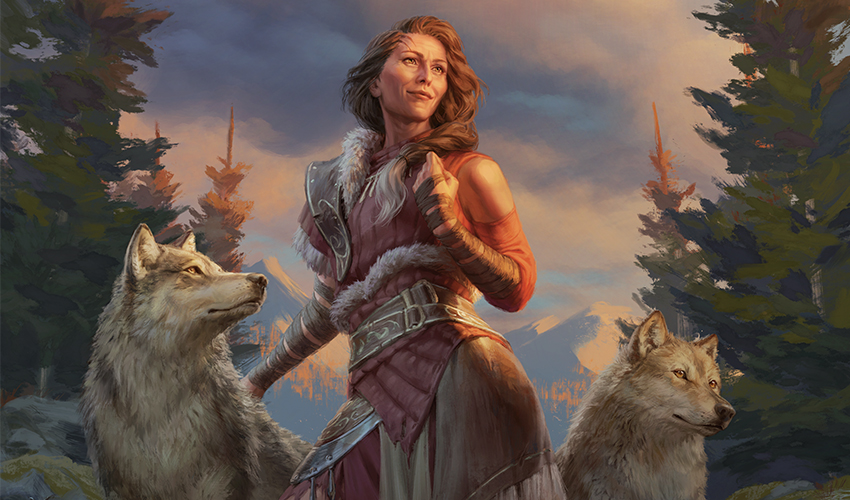
She can feel it even now as she sits in the elder's old home, even now as she tells his wife that she'll do her best to investigate these murders.
"It's every night, isn't it?" the woman says to her. Her voice is hardly more than a creak. "At night, I hear them calling to each other. My Finneas always says that if we mind our symbols, we'll be safe from them, but last night
In the other room, her Finneas's blood paints the walls red. Arlinn swallows. Her eyes fall on the Avacynian symbol right above the fireplace—half solid stone, half wire, and straw. The Travails took much from Innistrad, but faith is a hard thing to break. Even when the object of that faith falls as hard and far as Avacyn fell.
"It just doesn't make sense," says the woman—Agatha. "She was supposed to protect us. Everything seemed
Arlinn covers Agatha's hand with her own. Sometimes, in the face of unspeakable odds, a simple human connection can find its voice. Agatha sniffs. She looks up at the symbol herself, her gaze falling to the ground the moment she beholds it.
"We aren't alone," Arlinn says. "No matter how dark it may seem, the dawn will come—one way or another."
"Easy for you to say."
But it isn't easy to say at all. Especially not for Arlinn, who remembers so vividly the angel's raised spear. For weeks after The Travails, her wolves wanted nothing to do with human society, and she could hardly blame them. To walk among man was to breathe in their sorrows and bear their weight. The woods brought life, the roads and churches and villages only endless death.
Yet death is everywhere on Innistrad, and to turn from it is to turn away from the beauty of human endeavor. Living in the woods is easier, yes; simpler, yes; but the triumph of a hunt is a distant second to the triumph of a village against the encroaching night. To build a place where children do not fear the dark takes many years, but its rewards last generations.
So she visits the villages and towns of Kessig, doing what she can to fortify them against the darkness.
Agatha throws another log on the fire. As she sits back down into the old, thread-worn chair, she pulls her husband's cloak more tightly around herself. Her breath is misting, too. Arlinn considers asking her what she sees in it.
"Miss Kord," she says.
"Yes?"
"It's getting darker, isn't it?"
Arlinn swallows. A glance out the window is all that's needed to confirm Agatha's fears. They both know what the answer is. That she'd even ask speaks to how raw her husband's death the previous night has left her; Kessigers so often rely on their superstitions to keep them safe from things they'd rather not name.
Best not to lie. "Yes, I think it is."
Agatha draws up her knees. "Gustav and Klein say their crops aren't growing the way they ought to. The chill's been bad for them, but they aren't getting any light either."
"Harvest isn't far," Arlinn says. "You'll have to increase stores, but there should be enough to feed everyone this season. The hunters can make up the rest."
"This season," Agatha repeats. "What about the next? And what happens when all of our hunters are
She gestures to the other room, to the blood Arlinn can taste at the back of her throat. The scent of it calls to a primal part of her—a part that wants to say that the hunters will find more meat than ever when there are so many wolves among them.
"They say it was a vampire. Can you believe that? A vampire out here?" Agatha says. "The watch, they tracked him down. Asked me if I wanted to see his heart. They said it was an easy thing to kill him."
"I think I saw them on my way here," Arlinn says. "Working on
There's a weak smile on Agatha's face. It feels like progress. "That's the witch's doing. Finneas thinks it's a good idea, that she can help us. Thought it was."
Arlinn pours her another cup of tea. In the chill air, steam curls out of the cups, reaching higher and higher. The bright scent of herbs makes the gray den brighter.
"Here," she says. "All those tears are going to leave you thirsty, whether you know it or not."
She smiles again and tips the cup to her lips. "It's good. I don't know what you put in it, but the spices feel warm."
"It's an old family recipe," Arlinn says. Really, it's mixed largely based on what felt right to her nose the last time she was out in the woods. "If I shared it, they'd haunt me."
There's something like a laugh from Agatha—a short breath, a longer one. "Can't have that."
"No, we can't," says Arlinn. She pours herself a cup, too. "So—here's an idea. As long as we're drinking these two cups, we'll talk about our families. I'll tell you all about my brothers, and you can tell me about Finneas."
Her nod is half-hidden in that oversized wool sweater. "All right. I-I can do that."
"I'm glad," says Arlinn. "And afterward, you can tell me more about that witch."
Arlinn knows these woods, and they know her. Everywhere her eye lands, a memory waits to greet her. Here—the scratches in an oak from an old hunt. For two days, she and her wolves tracked a white stag through the forest. You'd think it'd be easier to find than it was, but there was something about that stag, something that bewitched her whenever she caught its scent. By the time she and the wolves cornered it at the foot of a cliff, they let it go. Sometimes just laying your eyes on something's gift enough.
That isn't what the wolf tells her, though. She remembers seeing it before her: its eyes the pink of blood and water, its fur bright as the snow she so often dreamed about. She remembers the hunger growing in the pit of her stomach. When you're on all fours, it's so easy to taste something, so easy to bite and tear and claw. The timber wolves at her side made their intentions known in low growls and gnashing teeth. They were hungry, too.
But there was something of the moon about that stag, something that told her that it was not for their stomachs. Innocent beauty was a rare thing on Innistrad, as rare as innocence, and she'd not be the one to strike it down. Arlinn shifted back to her human form. The wolves sat, grumpy though they were, and said no more as she whispered a blessing.
Away ran the white stag.
Back to the hunt, the wolves.
In the end, finding another meal hadn't been so difficult. They'd gone to bed, the five of them, curled up around each other with their stomachs filled with less holy meat.
And when in the morning they awoke, there was a skull before them, resting atop a sword driven into the ground. White fur clung to the bone. She knew the sword, she knew the scent that clung to the deer's flesh, she knew the message.
Tovolar never liked her softer tendencies.
Wherever he is and whatever he's doing are no longer her problem. They chose their paths long ago. He found his pack, and she found hers.
The wolves are eager to meet her and eager to play. Find witches, she told them, and they're happy to help in whatever way they can. Every few minutes as she runs through the woods, she'll hear one call and run over only to find an oddly shaped bough waiting for her, and the wolf looking at her expectantly. She thanks them, of course; even these strange boughs have their own clues waiting.
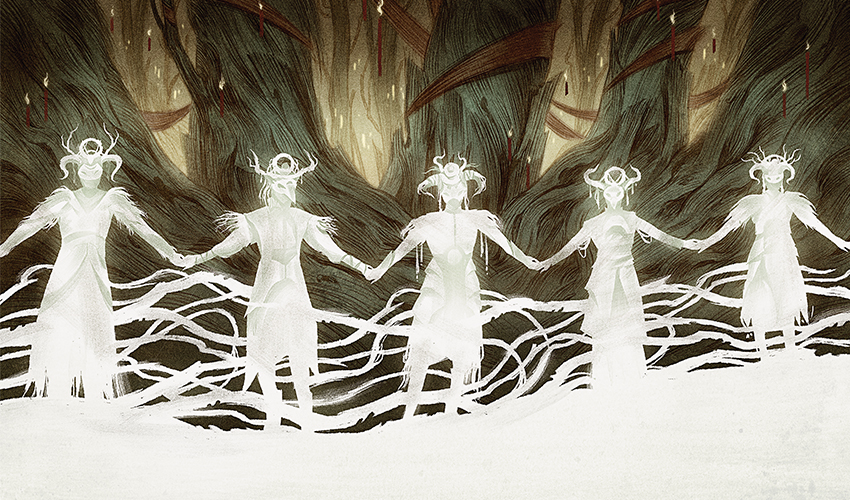
The further into the woods they go, the more the scent of the place changes. An astringent odor burns the inside of her nostrils; a warm, cinnamon perfume soon follows. When she shifts back to her human shape, she can see the bough more clearly: there is a clue here. A series of crescents and rounds line it, shaped by a careful hand. On the end —hanging from a branch—is a polished piece of opal. She squints. Are those shapes carved into it decorative or are they
Arlinn gives her companion a ruffle between the ears. "Good work," she says. "Let's fan out—that way."
He hops up and sinks back down and then he's off like a bolt. It takes her only a moment to shift and follow after him. He is the fastest of her pack. Wolves don't have names in the human sense, but it feels wrong to spend so much time with someone without lending them one. The white line along this one's flank, along with his impressive speed, led her to name him Streak. His mate, Redtooth, follows behind them at a reasonable pace, always alert for any potential dangers. Patience—so named when she waited outside the cathedral doors for her every day—raced Redtooth for third. Sometimes she'd even pull ahead. Boulder, the largest and friendliest of them, brings up the rear, his tongue flapping every which way.
Now that she knows what to look for, following the symbols is easy enough. She can give herself over to the hunt—the leaves underfoot, the chill forest air, her senses alight with life. Running on four feet feels so much more natural than jogging on two. Sometimes, she thinks that she might not even be running in her human form at all.
Boulder's excited howl is only the first. They all feel it, the thrill of this untamed wild, the dangers of Innistrad made distant by the joy of the moment. Arlinn joins them. For this moment, at least, she wants to feel free.
But no sooner has the howl left her than she sees it: a stag, pure white, beneath a branch festooned with carved silver. His pale pink eyes lock with hers.
Arlinn skids to a halt. Hackles rise along her back; she growls to the others to stop. Something's wrong. There can't be two of them, and to encounter it here of all places
She isn't going to be fooled. A deep breath of the air lends her some insight—as does the stag simply pacing its way around the gathered group. First—it doesn't smell anything at all like a stag. Sweat, yes; dye, yes; even the scent of magic, but nothing like a stag. Second, it isn't acting like one either. Everything in the forest runs from a pack of wolves. The only exceptions are other werewolves. But this isn't like that, either.
The stag paces around them. Redtooth lowers her muzzle and snarls as he draws near. The stag draws away, locking eyes once more with Arlinn. The way he's tilting his head is the last clue she needs.
Arlinn barks an order at the others to stay put. She slinks behind a tree and shifts back to her human form. Patience bounds over with her leather pack—she reaches in for her clothes.
"Katilda, isn't it?" she calls. "I hope you'll give me a moment to make myself decent."
The woods around her seem to laugh—she feels the thrill of it against her back as she changes. It's only as she looks around that she realizes they're beneath one of the massive stone arches of the Celestus. Something about the structure had always reminded her of a clock's inner workings. At times, it was said the arms shifted about the central platform—which itself was as large as any village green. Arlinn had never seen it happen herself, but she'd had all sorts of ideas about what ancient rituals must drive it.
They must have gone deep into the woods; Arlinn's mother always used to caution her to turn back whenever she saw the broken rings rising from the earth. As a child, she wondered what it would be like to climb their wide flat surfaces—if the people in Thraben woke up every day with that sort of view. Maybe if she got up there herself, she could pretend to be some pampered noble. Now, as an adult, she eyes the carvings along its pitted surface with worry, the lenses with distinct unease. Her mother had been right to warn her of the Celestus. Whatever purpose it once served is best left to the past.
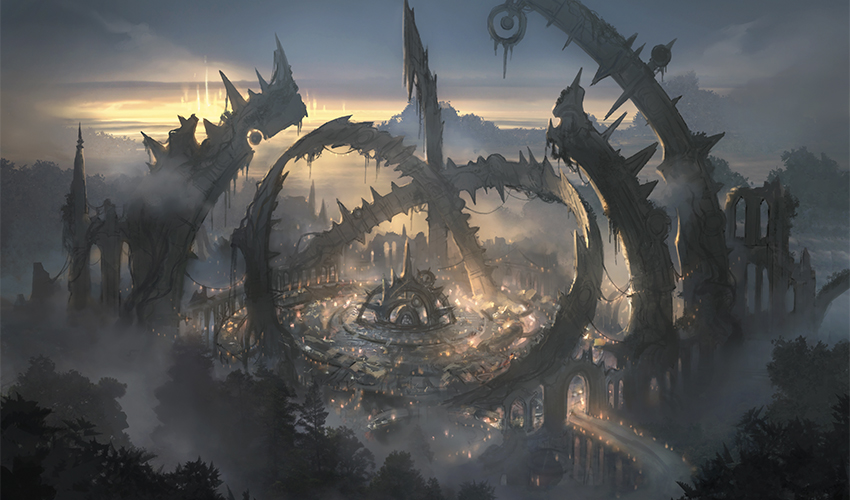
"If you'll forgive my little trick, I'll forgive you getting dressed," comes the answer. Her voice is at once charming and distant. She sounds, Arlinn thinks, like the sort of village matron who figured out a long time ago that you were the one stealing her pies. "The wolves in this forest aren't typically so well behaved. Most of them would have attacked."
Arlinn rounds the trunk. Where there had once been nothing but trees and underbrush, she now sees an enclave: branches and hides fashioned into tents, decorated with the same crescents and spheres she'd seen earlier. Floating candles lend the place an eerie light, as do the strange scarecrows throughout. Arlinn frowns. Candleguides—that's what her mother used to call them. There's an old story about one saving a boy lost in the woods and walking with him all the way to the Harvesttide festival. Another story told of hunters stalking through the Ulvenwald in search of pelts. One year, none returned. The next, these guides sprang up, born of their family's anxieties. She never expected she'd see one in person, let alone so many. The grins carved into their dripping-wax faces
But there are people, too, in the enclave—perhaps two dozen of them. Some women, some men, some seeming to eschew such labels. Clad in elaborate headdresses, they mutter spells before the candleguides. A dark-skinned man carves a grinning pumpkin, the swinging moonstones on his headdress winking in the light. Two women surround a cauldron bubbling and broiling. Perhaps it's the chill in the air, but Arlinn can see the smoke rising from a few yards away. And so, too, can she smell the delicious brew.
And there is one woman sitting before them on a mossy stump with a staff across her lap. Her white hair is looped through the many branches of her headdress; the pale crescent and sphere painted on her dusky skin only serve to make her features blend in. It's hard to tell, exactly, whether the wolves or Arlinn herself catch more of her attention—but she finds this all very amusing.
"We aren't most wolves," Arlinn says. Looking out at the enclave, she narrows her eyes. "And I take it you aren't most witches."
They can't be—Arlinn smells no evil in the air here. However frightening the shadows their headdresses lend them, however strange the paint renders their features, there's no mistaking they're human. That in itself is some comfort—even if she has no idea what they're up to. The magic here doesn't smell like typical magic. Like something that's been left to ferment, it has the scent of age to it.
"That depends on who you ask," says Katilda. "Before the Archangel's arrival, we were most witches. With her arrival, we took to the shadows, and now that she has departed, we are once again in the light."
Arlinn tilts her head. "You don't seem that old."
"It need not have been in this form, with this name," Katilda says. She points with her staff at the tree Arlinn's standing near. "An acorn is not, in itself, an oak. Given time, water, sun—it may become one. So it is with us."
"Then you're regrowing something," Arlinn says. "Who are you?"
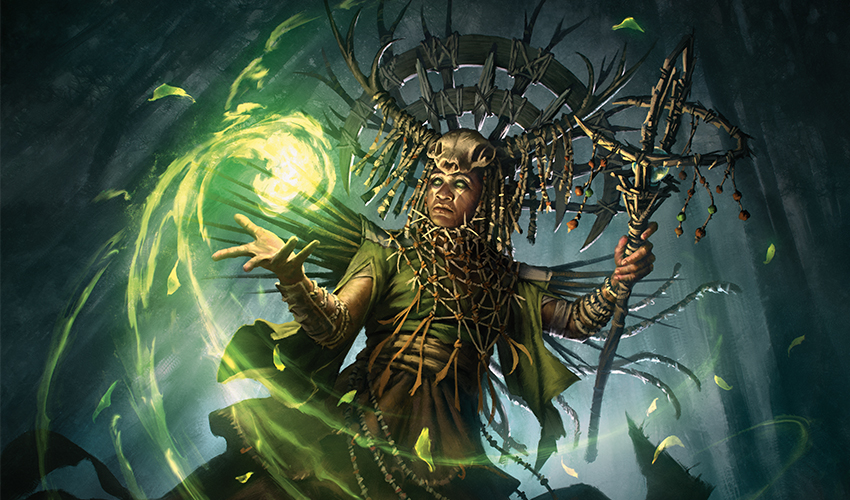
"We are what was once and will be. We are what the dark cannot kill. We are the Dawnhart Coven." The woman speaks with the voice of three, her eyes flashing with every syllable. The tip of her staff glows. She taps it to the earth. The brush surrounding them springs to life, growing rapidly, taking strange shape. In a matter of seconds, Arlinn recognizes it: the proud head of the white stag. "But who are you, wolf?"
"My name is Arlinn Kord," she answers. She doesn't look the branch-stag in the eye, not even when the eyes flower. She knows well enough the scent of nightshade. "There won't be any Dawnhart Coven if there isn't any dawn—and at this rate, there won't be one for long. I'm here for answers."
"You didn't give me one." Another tap from the staff—vines flow to fill in the gaps of the stag's head. It walks two steps, then bows to Katilda: a supplicant before a strange sovereign. "But we'll leave that aside for now. My answers for you are as clear as the forest around you and the beating of your own human heart."
Streak's beating his tail against the earth. Arlinn's not feeling much more patient herself. This witch, this Katilda—what is it with people like her and dragging things out? "Could you make them a little clearer?" she says. "My eyesight isn't what it used to be."
The witch touches the staff to the stag's head. From it, a crown of branches and flowers. "There is a ritual for just this."
Arlinn doesn't watch the stag bound away—she keeps her eyes on Katilda. "If there's anything I've learned, it's that rituals are never easy."
"Therein lies their power—a ritual centers the community and its traditions. Over time, hundreds add their faith to its power, far surpassing anything a single mage might dream of doing," says Katilda. "The Archangel distracted us from these traditions. We must return to them—to Harvesttide."
Avacyn didn't distract anyone from anything—but now isn't the time for that fight. No matter how much it burns in Arlinn's chest. "Harvesttide? Like in the old stories?"
"The very same," answers Katilda.
"Spiced tea and pies?" says Arlinn. The fire burns hotter. As an Avacynian priest, Arlinn knew well how strong the Archangel's protection had been. "How are those supposed to save us?"
"Harvesttide is more than that," she says. "The sun and moon both have their turn in the sky. Harvesttide is humanity's turn—our celebration of living another year in defiance. Too long we've lived in fear, too long we've relied on external forces to save us. We must save each other. By gathering together—"
"Wait," says Arlinn, holding up her hands. "You're planning on gathering how many people?"
"As many as will come," says Katilda, with all the patience of a village priest. "Together, we can draw on our collective strength beneath the Celestus and, through it, restore the balance."
Arlinn shakes her head, her exasperation breaking through. "Might as well send a letter to every night stalker in Innistrad. Putting that many humans in one place is begging for an attack. We've seen enough death already; we don't need to stake more lives on some old story you read in a book somewhere—"
"I didn't read it in a book," Katilda answers. Now she's gone sharp, too, standing from her stump. To Arlinn's surprise she's a towering woman—sturdy as the oaks she praised. A faint scent of loam hits Arlinn's nose—but it doesn't make sense. Katilda's no ghoul. "There will be wards, Arlinn Kord. Guardians, who can now exchange what they've learned to drive off the dark. You want to bring back the dawn? Very well. But you cannot do it without bringing back the hope we've lost."
Redtooth growls. So does Streak. Their discomfort echoes in Arlinn's chest: there's no way this is going to go well. Yet as she stares the old witch down, there's no sign of a break.
"You haven't even told me how this ritual works," Arlinn says, "assuming we don't all get killed first."
"We?" answers the witch—but she does not linger over the barb. Instead, she points with her staff to the arch of the Celestus. "The answer, as I told you, is right here. We use the Celestus. At its center is a lock of bright gold—we need the Moonsilver Key to activate it. Haven't you ever wondered what it's for? Our ancestors used it for just this—righting the balance of day and night."
"In the Kessig Woods, surrounded by the enemy."
"Yes. To stoke the fires—"
"—of Hope," Arlinn cuts in. "And if we don't? If we find some other way—"
"There is no other way," Katilda says, just as firm. "If the Celestus isn't activated—and if it isn't activated properly—then the night will overtake the day. Geists, ghouls, vampires, werewolves—you will feast on us until—"
"I'm not—"
But a sound cutting through the woods stops her voice in her throat. A howl, rough and deep. A sound that sets the wolf within her alight. Her pack answers, and she can feel their joy, feel their eagerness for the hunt.
For she knows that howl well. She heard it for the first time years ago, huddled in her room, staring up at the symbol meant to keep her safe. And she had torn from her family's home, feet and hands against the damp midnight earth, running toward it with all she had—because it spoke of a fearless Innistrad.
The first time she heard that howl was twenty years ago—the first night she tasted blood, the first night she tasted freedom.
It still stirs her, even now.
Tovolar.

